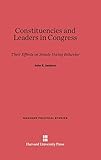Constituencies and Leaders in Congress : Their Effects on Senate Voting Behavior / John E. Jackson.
Material type: TextSeries: Harvard Political Studies ; 12Publisher: Cambridge, MA : Harvard University Press, [2013]Copyright date: ©1974Edition: Reprint 2014Description: 1 online resource (217 p.)Content type:
TextSeries: Harvard Political Studies ; 12Publisher: Cambridge, MA : Harvard University Press, [2013]Copyright date: ©1974Edition: Reprint 2014Description: 1 online resource (217 p.)Content type: - 9780674418745
- 9780674418752
- 328.73/07/75
- JK1161.J3
- online - DeGruyter
| Item type | Current library | Call number | URL | Status | Notes | Barcode | |
|---|---|---|---|---|---|---|---|
 eBook
eBook
|
Biblioteca "Angelicum" Pont. Univ. S.Tommaso d'Aquino Nuvola online | online - DeGruyter (Browse shelf(Opens below)) | Online access | Not for loan (Accesso limitato) | Accesso per gli utenti autorizzati / Access for authorized users | (dgr)9780674418752 |
Browsing Biblioteca "Angelicum" Pont. Univ. S.Tommaso d'Aquino shelves, Shelving location: Nuvola online Close shelf browser (Hides shelf browser)

|

|

|

|

|

|

|
||
| online - DeGruyter Louis D. Brandeis : Justice for the People / | online - DeGruyter Revising Shakespeare / | online - DeGruyter Two Hungry Giants : The United States and Japan in the Quest for Oil and Ores / | online - DeGruyter Constituencies and Leaders in Congress : Their Effects on Senate Voting Behavior / | online - DeGruyter The Harvard College Observatory : The First Four Directorships / | online - DeGruyter Lost Comrades : Socialists of the Front Generation, 1918-1945 / | online - DeGruyter Creating a National Home : Building the Veterans’ Welfare State, 1860–1900 / |
Frontmatter -- Acknowledgments -- Contents -- Tables -- 1. Legislative Behavior and the Determinants of Public Policy -- 2. A Model of Legislative Voting Behavior -- 3. Measuring Senate Voting Behavior -- 4. Voting Behavior of Individual Senators -- 5. Estimates of 1963 Voting Behavior: A Test of the Models -- 6. Voting Behavior on Specific Legislation -- 7. Constituencies, Leaders, and Public Policy -- Appendixes, Notes, Index -- Appendix A. The Development of the Constituency Variables -- Appendix Β. Problems of Guttman Scaling, Functional Form, and Coefficient Estimation -- Notes -- Index -- Backmatter
restricted access online access with authorization star
http://purl.org/coar/access_right/c_16ec
This study may be the most sophisticated statistical study of legislative voting now in print. The author asks why legislators, especially U.S. senators, vote as they do. Are they influenced by their constituencies, party, committee leaders, the President? By taking a relatively short time span, the years 1961 to 1963, the author is able to give us answers far beyond any we have had before, and some rather surprising ones at that. Constituencies played a different, but more important role in senators' voting than earlier studies have shown. Senators appeared to be responding both to the opinion held by their constituents on different issues and to the intensity with which these opinions were held. On the interrelation of constituencies and party, Mr. Jackson finds that Republicans and southern Democrats were particularly influenced by their voters. The clearest cases of leadership influence were among the non-southern members of the Democratic Party. Western Republicans, on the other hand, rejected the leadership of party members for that of committee leaders. Finally, on Presidential leadership, Mr. Jackson shows that John F. Kennedy influenced senators only during the first two years of his administration. All of these findings challenge conventional wisdom and are bound to influence future work in legislative behavior.
Mode of access: Internet via World Wide Web.
In English.
Description based on online resource; title from PDF title page (publisher's Web site, viewed 29. Nov 2021)


